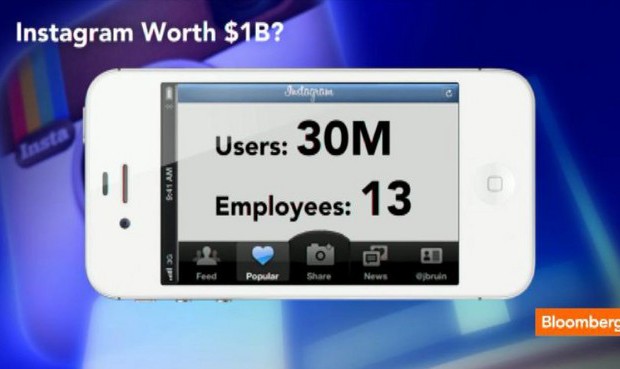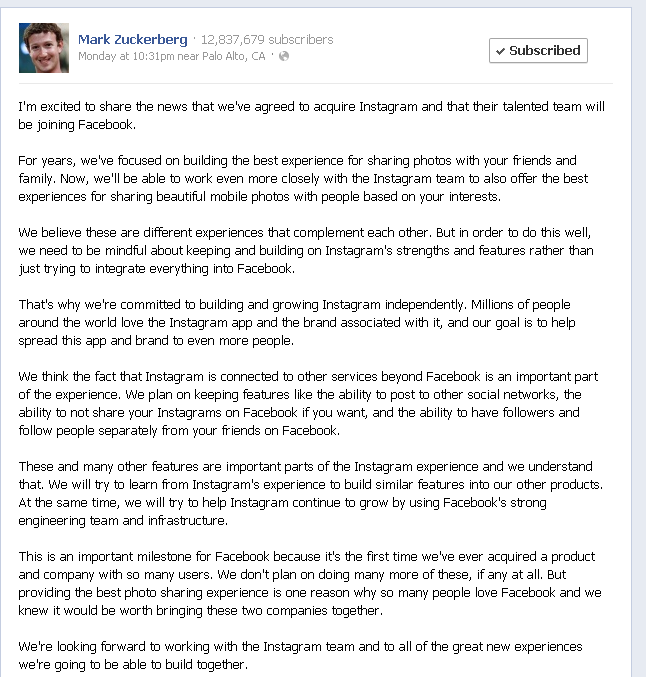Earlier this week, Instagram--the beloved iPhone app for snapping, filtering, and sharing photographs--arrived on Android phones, nearly a year and half after the iPhone app's initial release. Until that time, folks using Android phones could only look on longingly as their iPhone-wielding friends snapped and shared photos on the growing network, which topped 30 million members before making the leap to Android.
And Instagram's gradual iOS-to-Android transition is not unusual. It took almost a year for Angry Birds to make its pig-hating way from iOS to Android, and twice that long for Words With Friends. So it's clearly not uncommon for hugely successful apps to launch on the iPhone, only to show up on Android many moons later. But for apps to make the opposite leap--from Android to iPhone--is exceedingly uncommon. There are two key reasons why that dichotomy exists: money and simplicity.
In fact, if an app isn't built by Google, odds are good that it's coming to Android only well after it arrives on the iPhone--if at all. Sure, Android phones got Gmail first (and, frankly, they can keep it). But it's rare for Android to get major apps first, and the situation hasn't improved despite Android's continued impressive adoption rates.
Why Android's market share doesn't matter
Although recent reports suggest that the iPhone is outselling all other smartphones combined, comScore still says that Android phones make up a little more than half the market.
But even if Android is the market share king, developers aren't targeting the platform with the enthusiasm they lavish on iOS. That's partly because of the other major devices that the App Store caters to--the iPad and the iPod touch--two lines that few Android devices can reasonably claim to compete with successfully.
ComScore also tells us, however, that iPhone owners use both Wi-Fi and cellular connections on their phones significantly more often than Android phone users do. That might mean Android device owners just can't figure out how to use their phones' Wi-Fi. The more likely explanation for the sharp difference--one set forth by John Gruber, among others--is that a lot of Android device owners use their smartphones as something less than that: touchscreen machines for texting and calls, perhaps with the occasional game or two.
Whatever the reason, Android users aren't buying apps. And that's a problem for that platform, since developers, like Willie Sutton, prefer to...
Go where the money is
Developers, like all of us, enjoy earning money in exchange for the work that they do. And developers with experience on both platforms report emphatically that they can make more money in the iOS App Store than they can in any of the several stores that cater to Android device users.
Take the case of developer Ryan Bateman, who built what reviewers called "the first beautiful, simple Instapaper client for Android." Despite heavy tech news coverage about Papermill following its release, Bateman says the app netted less than $600 in profit over its first three weeks in release. Bateman's effective rate for the project to date worked out to barely more than $2 per hour.
OK, so that's one app from one developer, and Papermill requires that you have a separate subscription to Instapaper's paid service (which costs $1 per month). But Bateman's tale of disappointing Android sales is anything but unique. Mike Mobile makes games like Zombieville USA. The company wrote in a March 2012 blog post that its "Android apps aren't making any money." In fact, the company says, "Android sales amounted to around 5% of our revenue for the year, and continues to shrink. Needless to say, this ratio is unsustainable."
Piper Jaffray analyst Gene Munster concluded late last year that Google's Android Market (since rechristened Google Play) generated a scant 7 percent of the revenue driven by the App Store. The App Store, Munster said, receives 85 to 90 percent of the total dollars spent purchasing mobile apps.
And we're talking about a lot of money: Apple says that it's paid out more than $3 billion to developers in the App Store. (Apple gets 30 percent of every App Store sale.)
Why the vast majority of Android customers don't seem willing to spend money on apps is anyone's guess. But it's a self-perpetuating problem; with lower sales, many developers are forced to upend the App Store's race-to-the-bottom for pricing. So now, the apps folks mostly aren't buying from the various Android app stores also cost more money.
But money doesn't explain everything. It certainly doesn't explain why it took Instagram so long to land on Android--given that Instagram is a free app, and its business model is largely still to be determined. No, the explanation for that half of the problem falls into...
The simplicity bucket
We already know many mobile developers avoid targeting Android because they can't make money there. But another big problem is developers don't feel assured they can make great apps for the platform, either. Building a great iPhone app isn't easy. Building a great Android app falls just shy of impossible.
iOS continues to score excellent apps from developers who haven't yet indicated any plans to launch on Android. Epic, the developers behind the smash iOS game Infinity Blade, say that they "can't guarantee" a consistent user experience for Android--because there are so many different Android devices. Devices might have different processors, different screen sizes, and different amounts of memory.
That's partially true of the iPhone as well, of course: The iPhone 4S enjoys a meatier processor than the iPhone 4, which in turn uses a better processor than the iPhone 3GS. But iOS developers know that no new iPhone will ever be less powerful than the models that preceded it; Epic said that the 3GS was the first iPhone powerful enough to run the gaming engine upon which Infinity Blade is built. But a powerful Android phone from HTC may well be followed up by a less powerful one from Samsung. Some Android will sport hardware buttons that others don't.
And it's not just a hardware issue. Different Android phones support different versions of the operating system, and there's no guarantee that a phone bought today will support an Android update released next month. With the iPhone, it's Apple's decision. With Android, it's up to the carriers and individual phone manufacturers.
The latest version of Android, dubbed Ice Cream Sandwich, is running on fewer than 3 percent of Android devices. (About 64 percent of Android devices are running Gingerbread, which was released at the end of 2010 and supplanted--in theory--by Honeycomb, before Ice Cream Sandwich's release.)
Reports peg adoption of Apple's latest iOS release, iOS 5.1, at nearly 80 percent within its first 15 days of availability.
Thus, Android phones are the printers, and developers who want to make apps must build the ink. Ever felt lost in your local office supply store as you try to find the right black ink for your printer? There are oodles of models and sizes--even within brands. Developers making apps for Android, in effect, need to make ink that works with every printer.
On the iOS side, things are considerably simpler. To push the analogy to its limits, successive iOS devices might print faster or higher quality images, but they still take the same ink.
Game on
If you like Android, you buy an Android device. You either don't buy many apps, or at best you buy the apps you can, and recognize that the majority of the world's most exciting mobile development is happening across the aisle. That's your right.
If you're an iOS devotee, it's a win-win: You buy the device you want, and have the enormous App Store waiting to satisfy your every mobile need.
http://www.pcworld.com/article/253333/instagram_release_shows_why_developers_pick_ios_over_android.html#tk.hp_new
And Instagram's gradual iOS-to-Android transition is not unusual. It took almost a year for Angry Birds to make its pig-hating way from iOS to Android, and twice that long for Words With Friends. So it's clearly not uncommon for hugely successful apps to launch on the iPhone, only to show up on Android many moons later. But for apps to make the opposite leap--from Android to iPhone--is exceedingly uncommon. There are two key reasons why that dichotomy exists: money and simplicity.
In fact, if an app isn't built by Google, odds are good that it's coming to Android only well after it arrives on the iPhone--if at all. Sure, Android phones got Gmail first (and, frankly, they can keep it). But it's rare for Android to get major apps first, and the situation hasn't improved despite Android's continued impressive adoption rates.
Why Android's market share doesn't matter
Although recent reports suggest that the iPhone is outselling all other smartphones combined, comScore still says that Android phones make up a little more than half the market.
But even if Android is the market share king, developers aren't targeting the platform with the enthusiasm they lavish on iOS. That's partly because of the other major devices that the App Store caters to--the iPad and the iPod touch--two lines that few Android devices can reasonably claim to compete with successfully.
ComScore also tells us, however, that iPhone owners use both Wi-Fi and cellular connections on their phones significantly more often than Android phone users do. That might mean Android device owners just can't figure out how to use their phones' Wi-Fi. The more likely explanation for the sharp difference--one set forth by John Gruber, among others--is that a lot of Android device owners use their smartphones as something less than that: touchscreen machines for texting and calls, perhaps with the occasional game or two.
Whatever the reason, Android users aren't buying apps. And that's a problem for that platform, since developers, like Willie Sutton, prefer to...
Go where the money is
Developers, like all of us, enjoy earning money in exchange for the work that they do. And developers with experience on both platforms report emphatically that they can make more money in the iOS App Store than they can in any of the several stores that cater to Android device users.
Take the case of developer Ryan Bateman, who built what reviewers called "the first beautiful, simple Instapaper client for Android." Despite heavy tech news coverage about Papermill following its release, Bateman says the app netted less than $600 in profit over its first three weeks in release. Bateman's effective rate for the project to date worked out to barely more than $2 per hour.
OK, so that's one app from one developer, and Papermill requires that you have a separate subscription to Instapaper's paid service (which costs $1 per month). But Bateman's tale of disappointing Android sales is anything but unique. Mike Mobile makes games like Zombieville USA. The company wrote in a March 2012 blog post that its "Android apps aren't making any money." In fact, the company says, "Android sales amounted to around 5% of our revenue for the year, and continues to shrink. Needless to say, this ratio is unsustainable."
Piper Jaffray analyst Gene Munster concluded late last year that Google's Android Market (since rechristened Google Play) generated a scant 7 percent of the revenue driven by the App Store. The App Store, Munster said, receives 85 to 90 percent of the total dollars spent purchasing mobile apps.
And we're talking about a lot of money: Apple says that it's paid out more than $3 billion to developers in the App Store. (Apple gets 30 percent of every App Store sale.)
Why the vast majority of Android customers don't seem willing to spend money on apps is anyone's guess. But it's a self-perpetuating problem; with lower sales, many developers are forced to upend the App Store's race-to-the-bottom for pricing. So now, the apps folks mostly aren't buying from the various Android app stores also cost more money.
But money doesn't explain everything. It certainly doesn't explain why it took Instagram so long to land on Android--given that Instagram is a free app, and its business model is largely still to be determined. No, the explanation for that half of the problem falls into...
The simplicity bucket
We already know many mobile developers avoid targeting Android because they can't make money there. But another big problem is developers don't feel assured they can make great apps for the platform, either. Building a great iPhone app isn't easy. Building a great Android app falls just shy of impossible.
iOS continues to score excellent apps from developers who haven't yet indicated any plans to launch on Android. Epic, the developers behind the smash iOS game Infinity Blade, say that they "can't guarantee" a consistent user experience for Android--because there are so many different Android devices. Devices might have different processors, different screen sizes, and different amounts of memory.
That's partially true of the iPhone as well, of course: The iPhone 4S enjoys a meatier processor than the iPhone 4, which in turn uses a better processor than the iPhone 3GS. But iOS developers know that no new iPhone will ever be less powerful than the models that preceded it; Epic said that the 3GS was the first iPhone powerful enough to run the gaming engine upon which Infinity Blade is built. But a powerful Android phone from HTC may well be followed up by a less powerful one from Samsung. Some Android will sport hardware buttons that others don't.
And it's not just a hardware issue. Different Android phones support different versions of the operating system, and there's no guarantee that a phone bought today will support an Android update released next month. With the iPhone, it's Apple's decision. With Android, it's up to the carriers and individual phone manufacturers.
The latest version of Android, dubbed Ice Cream Sandwich, is running on fewer than 3 percent of Android devices. (About 64 percent of Android devices are running Gingerbread, which was released at the end of 2010 and supplanted--in theory--by Honeycomb, before Ice Cream Sandwich's release.)
Reports peg adoption of Apple's latest iOS release, iOS 5.1, at nearly 80 percent within its first 15 days of availability.
Thus, Android phones are the printers, and developers who want to make apps must build the ink. Ever felt lost in your local office supply store as you try to find the right black ink for your printer? There are oodles of models and sizes--even within brands. Developers making apps for Android, in effect, need to make ink that works with every printer.
On the iOS side, things are considerably simpler. To push the analogy to its limits, successive iOS devices might print faster or higher quality images, but they still take the same ink.
Game on
If you like Android, you buy an Android device. You either don't buy many apps, or at best you buy the apps you can, and recognize that the majority of the world's most exciting mobile development is happening across the aisle. That's your right.
If you're an iOS devotee, it's a win-win: You buy the device you want, and have the enormous App Store waiting to satisfy your every mobile need.
http://www.pcworld.com/article/253333/instagram_release_shows_why_developers_pick_ios_over_android.html#tk.hp_new







